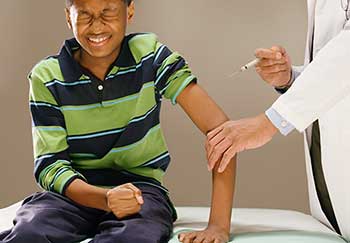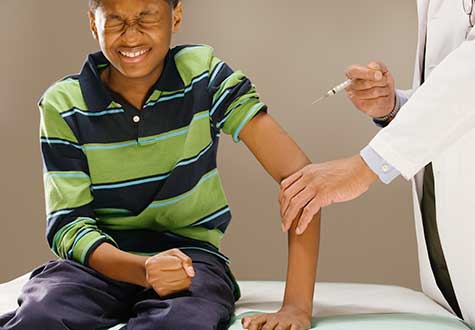
If you could give your child a vaccine to prevent cancer, would you? Seems like a no-brainer, right? And yet, although such a vaccine does in fact exist, only 49 percent of girls and 37 percent of boys have received it in the U.S.
“For the past 10 years, we have had the ability to eradicate cervical cancer and drastically reduce other types of cancer related to the human papillomavirus (HPV), but it hasn’t happened,” confirms Susan Modesitt, MD, a gynecologic oncologist at UVA Cancer Center.
Contrast this to the British Isles, where mandatory HPV vaccinations of girls since 2010 has reduced the incidence of cancer-causing virus by 80%. And last summer, Scotland and England extended their vaccination programs to include boys.
Here in America, where HPV vaccination remains optional, Modesitt says a lack of healthcare access and insurance coverage contributes to the low rate of adherence. But she also notes that parents have misconceptions about HPV and the vaccine that scare them away.
Yes, It’s Recommended: HPV Vaccine for Boys
As demonstrated by the statistics, a lack of correct information continues to make people think that HPV only causes cancer in girls, leading to the lower rates of vaccinated boys.
As the mother of a tween son, the thought of talking to him about getting a shot (he hates them) that prevents an infection he could get from sexual activity wasn’t super fun.
“But you don’t have to!” insists Heather Payne, NP, who works in the UVA Teen & Young Adult Health Clinic. She advises parents to let kids know that “at age 11 or 12 they are due for three vaccines: HPV, meningitis and TdaP (to prevent certain types of cancer, meningitis, tetanus, diphtheria and pertussis).
Payne notes that many parents and providers recoil from giving the HPV vaccine to avoid discussing sex. “There really is no need to get into a discussion about having sex when giving vaccines,” she adds. “No one talks to parents of little kids about Hepatitis B being a sexually transmitted infection when they are getting that series in childhood.”
She hopes parents will focus on the the fact that the HPV vaccine could save your child from getting cancer: “With the rising rates of HPV-related oropharyngeal (mouth-throat) cancers, I believe this is just further reason for everyone, including young men, to get the vaccine.”
HPV Facts: 6 Surprises
#1: You Probably Have It
HPV is so prevalent that 80% of us will contract it at some point in our lives.
In fact, “just about everyone who has any type of physical contact with another person is exposed to HPV,” Modesitt says.
#2: HPV is Not Just a Sexually Transmitted Disease
That’s right. The HPV virus can make its way from one person to another just through skin-to-skin contact. While this contact usually occurs on an intimate level, you don’t have to have sexual contact to get infected.
“I liken HPV to the common cold,” says Modesitt.
#3: Not All HPV Infections Cause Warts
If you associate HPV with genital warts transmitted through sexual activity, you’re not completely off the mark — just mostly.
“Of the 200 types of HPV, only two — HPV 6 and 11 — cause genital warts,” Modesitt says. “These types of HPV rarely develop into cancer. Other types of HPV, including the 13 high-risk strains, typically have no symptoms, so you may unknowingly have the virus and spread it to others.”
#4: Not All HPV Infections Need Treatment
According to the CDC, most HPV infections fade away by themselves.
#5: HPV Can Cause More Than Cervical Cancer
When the HPV vaccine first arrived on the scene, most of the promotional advertising use focused on preventing cervical cancer in girls.
But health providers like Modesitt and Payne want people to know that the HPV poses the risk of serious, often deadly cancers that include:
- Vaginal/vulvar
- Mouth
- Tonsils/Throat
- Penile
- Anal
#6: There are Limited Tests for HPV-Related Cancers
Pap smears screen for cervical cancer. This is great, because “HPV-related precancerous cells can be treated to prevent progression in many cases,” says Payne.
But the other cancers? You aren’t going to know you have them until you notice symptoms.
What You Need to Know About the HPV Vaccine
It’s safe. “The vaccine has been around for a long time and the safety data is excellent,” assures Payne.
It’s effective. The current HPV vaccine protects against the two strains that cause 70 percent of cervical cancers as well as five other strains implicated with HPV-associated cancers.
When to Get Vaccinated: HPV Vaccine Schedule
- Before age 15, you need two doses
- After age 15, you need three doses
- Optimal age for vaccination is 11-12
- You can still benefit from vaccination up to age 26 (and insurance will cover it)
- The FDA has approved the vaccine for adults up to age 45
The younger, the better. There are a few reasons for this.
“You want to vaccinate prior to close contact, so it is approved as early as 9,” Modesitt explains. (And contact does not necessarily mean sexual, but can include the sexual kind.) “Like any vaccine, the HPV vaccine needs time to take effect before it can adequately protect against infection.”
But also, as Payne points out, “the immune response is so much better in younger people.” Early vaccination packs an extra-protective punch. Plus, kids “who start the vaccine series before age 15 only need two doses of vaccine, whereas those who start the series later need three doses.”
Educate & advocate. Payne’s heard from a number of parents who only realized when they got home from the 11-year-old check-up that the providers only ordered Tdap and meningitis vaccines, didn’t even mention HPV, and the families had to make return visits specifically to complete the recommended vaccines.” Make sure your child’s pediatrician gives all three vaccines.
HPV Vaccine for Boys
There are more males getting cancer of the oropharynx (back of the throat, including the base of the tongue and tonsils) from HPV than girls getting cervical cancer.
This current trend should be disturbing enough to convince all parents of preteen boys to get their sons the HPV vaccine.
Get Your Child Vaccinated Against HPV
Choose from several pediatric clinics throughout central Virginia or visit the Teen & Young Adult Health Center.
Another argument for prevention: There’s currently no approved screening test for HPV in boys. If your son gets infected, he could go years without knowing it. He could spread it or develop cancer, without a clue.
Play it Safe for Their Sake
HPV is the most common sexually transmitted disease (STD). But even if your teens don’t have sex, they can get infected with HPV, which can lead to cancer – in your child or someone else’s.
The safe, effective vaccine won’t protect against other STDs or infections. And it won’t keep your child from heartbreak and other collateral damage of adolescence. But what it can do is keep your teen HPV and cancer free.
As Modesitt sees it, the HPV vaccination gives all of us a huge opportunity. “All we need is more parents to understand and embrace this amazing opportunity to vaccinate their children to prevent cancer,” she says. We have the power to eradicate it.
